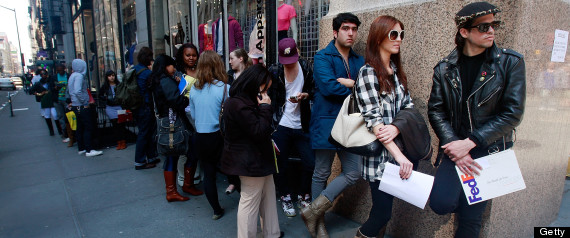
As all things sex-trade related have bubbled to the surface as a hot topic in Canadian politics (and features as the subject for next Monday's Why Should I Care) I've found myself thinking about the social views around prostitution.

It's generally accepted that prostitution is not a desirable career, as in no child dreams of growing up and becoming a prostitute like they may a lawyer or a politician. It's recognized that being a prostitute is a potentially dangerous job, carrying the risk of catching (and transmitting) sexually transmitted diseases, but also the risk of abuse by clients and exposure to seedier elements of society.
Are those reasons to stigmatize prostitution as a trade, though?
I don't imagine many kids dream of growing up to clean floors or toilets or collect garbage, but those things get done. I know in my home town (Cornwall) kids in school would often assume they'd follow in their parents' footsteps and work on a factory assembly line - this wasn't a lofty, aspirational goal, but then work was seen as a way to make a living rather than a focus on personal growth. Life was what was lived outside of the 9 - 5 workday.
At the same time, I know a bunch of kids who paid their way through university by performing as stripper at strip joints frequented by factory workers after that work day ended.
Not to diminish STDs, but there are a great number of illnesses that can be contracted on other jobs, ranging from cancer through inhaling chemicals as a firefighter, coming down with PTSD as a police officer or social worker, even carpal tunnel syndrome from too much typing (I fit in this category). It could be losing a limb on a factory floor, too.
For all these careers, though, government (through fits and starts) tries to create and enforce safety standards so that these vital positions can be carried out with minimal risk to the worker. Do we penalize the consumer of products developed in unsafe conditions? I imagine there are a host of kids in Bangladesh who'd disagree with that notion.
That leaves the exposure to seedier elements of society and the risk of exposure to drugs, crime, etc. What we always miss in these sorts of conclusions is the fact that crime breeds where civil society opts not to tread; safe drug injection sites, licensed brothels, transparent government are all ways to cast light into the dark corners of our society and bring them into the mainstream.
So, all this aside -
why is it that we look down on sex as a trade? And is it the actually the case that nobody wants to be a prostitute? I find it hard to believe there aren't some
who gain meaning from their profession.
The stigma around prostitution has less to do with the logistical nature of the work, I think, and more to do with the cultural associations surrounding it.
One - when we think prostitutes, we tend to think women. Women, in our eyes, are mothers; each should be Gaia - nurturing, loving, child-focused and family-oriented. Sex is a means to create babies which women nurture into adults who repeat the cycle. For a woman to sell sex is somehow a betrayal of this unspoken (and unagreed upon) social contract.

Two - sex is power. Men the world over like to feel strong and in charge, yet are fearful of the power women have over them (
Oscar Pistorius or
Boko Haram, for instance). For alpha males that like to feel they're in charge, there must be something disconcerting about women having ownership over their own sexual relations and not needing to be property of any one man.
Three - sex is a biological act that, at its core, is about reproduction. Human babies are totally helpless, requiring a certain level of parental commitment for those children (our future) to survive. A kid you can buy at the corner store will have less value and, theoretically, receive less attachment than a child conceived through intimate acts between committed individuals.
Of course, sex is more than that - the sexual drive to reproduce is more deeply engrained in our cognitive matrix than is the urge to commit sociology. Even if we don't always act on sexual urges, we experience them; the hot guy or girl on the subway or in a TV ad may have us feeling lusty; attraction is, after all, why we pursue intimate encounters in the first place.
Where sex is a service, though, the intimacy is gone. The entire mythos around sex is gone. It becomes a transactional enterprise, something that could be bought and sold on the market.

Now, theoretically, you'd think the Conservatives would be all for promoting a money-generating enterprise, especially one as lucrative as sex. Imagine Canada having the best modern Geishas in the world, creating a regulated sex holiday sector that would draw in cash from all over the world. You could attract the best sex talent from around the world, creating a powerful industry - and then tax it.
But that's economics, not social conservatism, which brings us back to the Gaia complex. Prostitution is not a noble profession; no one with an ounce of nobility or integrity should want to take part it in, either as a provider or a consumer. In fact, folk like Peter MacKay seem convinced no prostitute wants to remain a prostitute and is just hankering to get out of the dirty business.
Which is a really interesting position to take, given the fact that MacKay is a politician.
MacKay, who I think it's fair to say had some tumbles in the hay with a couple of women prior to getting married and having a kid, is an expert at contorting himself into partisan knots and slips. He spins, deflected, misleads, obfuscates and is hypocritical. He's a great partisan politician in that it's easy for him to do whatever benefits his Party without any thought as to the ethical implications.
His boss, Stephen Harper, is even worse. We can't limit ourselves to just the Conservatives, though - through all Parties are Members who will spout rhetoric they don't believe in because it helps further their political career, will ignore issues of relevance because they can't be bothered and will generally twist the purpose of being a representative of the people for personal gain through partisan gain.
There are many elected officials with integrity, but there are plenty of partisan whores out there, too. Just as their are lawyers who will defend clients they know to be guilty or support insurance claims they know are fraudulent, because it pays their bills.
Such abuses of power and public interest are at least as "dirty" as sex with strangers, yet how many kids want to grow up to have powerful positions like this? How many politicians and their supporters like being in the ethical quagmire of politics?
It really doesn't seem that surprising that politicians and prostitutes should find themselves bedfellows.
Which is why sex as work is such an interesting, challenging topic. One the one hand, there are real risks that could be mitigated - that's logistics. There are financial gains to be had and capitalized on - that's economics. Then, there's all the social and biological baggage around sex.
So what are we to do?
There are solutions to be had, behaviours to be corrected and stigmas to be addressed - there always are. For any solution involving sex workers to work and be sustainable, though, here's an unavoidable truth -
Solutions can't be conceived on high and seeded among prostitutes; they have to be agents and drivers in the social/structural changes that will make them safe and empower them to make the choices that are in their best interests.
The next time we see changes to prostitution laws, it shouldn't be a frat boy like Peter MacKay leading the charge - it should be sex workers themselves. The role of the Minister should be to listen, empathize, facilitate, understand and serve as a conduit for solution.
Surely, Peter MacKay doesn't think that's women's work, does he?








